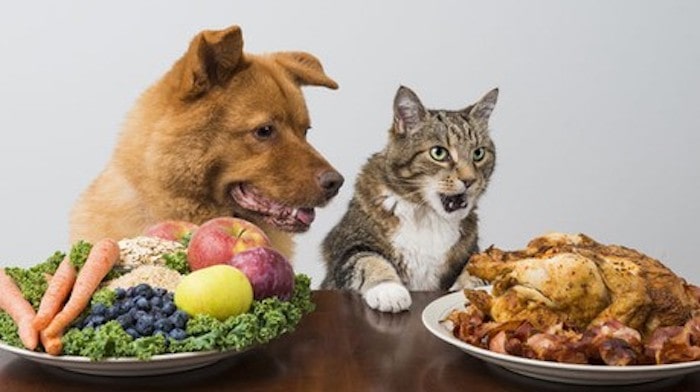Veganism is a lifestyle that avoids the use of animal products for ethical, environmental, or health reasons. Some vegans may also want to extend their principles to their companion animals, such as dogs and cats, and feed them vegan diets. But is this safe and healthy for our furry friends?

In this blog post, we will summarize the findings of a recent systematic review that examined the scientific evidence on the impact of vegan diets on dog and cat health. We will also discuss some of the benefits and risks of feeding vegan or vegetarian diets to dogs and cats, and provide some tips for pet owners who are considering this option.
What Is a Vegan Diet for Dogs and Cats?
A vegan diet for dogs and cats is one that excludes all animal products, such as meat, eggs, dairy, fish, and honey. A vegetarian diet may include some animal products, such as eggs and dairy, but no meat or fish.

Both vegan and vegetarian diets for dogs and cats rely on plant-based sources of protein, such as soy, beans, lentils, peas, quinoa, rice, and wheat gluten.
They may also include fruits, vegetables, grains, nuts, seeds, and supplements to provide essential nutrients that are normally found in animal products.
What Does The Scientific Evidence Say?
The systematic review by Knight et al. (2021) searched the literature for studies that assessed the health effects of vegan or vegetarian diets on dogs and cats. They found 11 studies that met their inclusion criteria, but none of them were randomized controlled trials or cohort studies, which are considered the most reliable types of evidence. Most of the studies were surveys, case reports, or case series, which have limitations in terms of sample size, selection bias, and causality.
The review found that there was little evidence of adverse effects arising in dogs and cats on vegan diets. Some studies reported lower body weight, lower blood pressure, lower cholesterol levels, and improved coat condition in dogs on vegan diets compared to dogs on meat-based diets. However, these findings were not consistent across all studies and may not be clinically significant.
Some studies also reported deficiencies in certain amino acids (such as taurine and carnitine), vitamins (such as B12 and D), minerals (such as calcium and phosphorus), and fatty acids (such as arachidonic acid) in dogs or cats on vegan diets.
These deficiencies can lead to serious health problems, such as dilated cardiomyopathy (a heart condition), anemia (a blood disorder), urinary tract infections (UTIs), bladder stones, skin problems, and reproductive issues. However, some of these deficiencies were also found in dogs or cats on meat-based diets or were corrected by supplementation.
The review concluded that there was limited scientific study on the impact of vegan diets on dog and cat health and that more research is needed to establish the safety and efficacy of these diets.
The review also recommended that pet owners who wish to feed their dogs or cats vegan diets should consult with their veterinarians and use commercial foods that have undergone feeding trials and meet the nutritional requirements for their species.
Benefits and Risks of Feeding Vegan or Vegetarian Diets to Dogs and Cats?
There are several potential benefits and risks of feeding vegan or vegetarian diets to dogs and cats. Some of them are:
Benefits
- Ethical: Feeding vegan or vegetarian diets to dogs and cats may align with the ethical values of some pet owners who want to avoid harming animals or supporting animal exploitation.
- Environmental: Feeding vegan or vegetarian diets to dogs and cats may reduce the environmental impact of pet food production, which contributes to greenhouse gas emissions, deforestation, water consumption, and pollution.
- Health: Feeding vegan or vegetarian diets to dogs and cats may improve some aspects of their health, such as weight management, blood pressure, cholesterol levels, and coat condition. It may also help with some medical conditions, such as allergies, arthritis, diabetes mellitus, IBD, kidney disease, liver disease, obesity, pancreatitis, and seizures.

Risks
1) Nutritional: Feeding vegan or vegetarian diets to dogs and cats may pose nutritional challenges, such as providing adequate protein quality and quantity, essential amino acids (such as taurine and carnitine), vitamins (such as B12 and D), minerals (such as calcium and phosphorus), and fatty acids (such as arachidonic acid). These nutrients are either minimal or absent in plant ingredients and require careful supplementation or fortification.
2) Physiological: Feeding vegan or vegetarian diets to dogs and cats may not suit their physiological needs, as they have evolved to digest and metabolize animal products more efficiently than plant products.
Cats are obligate carnivores, meaning they require animal-sourced ingredients to survive and thrive. Dogs are facultative carnivores, meaning they can adapt to a variety of foods, but still have a preference and a higher requirement for animal products than humans.
3) Medical: Feeding vegan or vegetarian diets to dogs and cats may cause or worsen some medical problems, such as dilated cardiomyopathy (a heart condition), anemia (a blood disorder), UTIs, bladder stones, skin problems, and reproductive issues.
These problems can result from nutritional deficiencies or imbalances or from inappropriate pH levels or mineral content in urine.
4) Behavioral: Feeding vegan or vegetarian diets to dogs and cats may affect their behavior, mood, energy level, appetite, digestion, coat quality, odor, dental health, and longevity. These effects can be positive or negative, depending on the individual animal’s response to the diet change. Some animals may reject or dislike vegan or vegetarian foods, while others may enjoy them.
Tips for Pet Owners Who Are Considering Feeding Vegan or Vegetarian Diets to Dogs and Cats?
If you are thinking about feeding your dog or cat a vegan or vegetarian diet, here are some tips to follow:
1) Consult with your veterinarian before making any changes to your pet’s diet. Your veterinarian can assess your pet’s health status and nutritional needs and advise you on whether a vegan or vegetarian diet is suitable for your pet.
Your veterinarian can also monitor your pet’s health regularly and perform blood tests or urine tests to check for any nutritional deficiencies or imbalances.
2) Choose a commercial vegan or vegetarian food that has undergone feeding trials and meets the nutritional requirements for your pet’s species. Commercial foods are more likely to be nutritionally complete and balanced than homemade foods.
They also have quality control measures to ensure safety and consistency. Look for foods that have an AAFCO (Association of American Feed Control Officials) statement on the label that indicates they are formulated to meet the nutritional levels established by AAFCO Dog Food Nutrient Profiles or Cat Food Nutrient Profiles for all life stages.

3) Avoid feeding your pet raw vegan or vegetarian foods. Raw foods can contain harmful bacteria or parasites that can cause infections or diseases in your pet. They can also pose a choking hazard or damage your pet’s teeth or gums. Cooked foods are safer and more digestible than raw foods.
4) Supplement your pet’s diet with synthetic vitamins and minerals if needed. Some nutrients that are normally found in animal products are either minimal or absent in plant ingredients. These include taurine, carnitine, B12, cobalamin , folic acid, and arachidonic acid.
These nutrients are essential for your pet’s health, and require careful supplementation if they are not provided by the food.
Some commercial foods already contain these supplements, but you may need to add them separately if you are feeding homemade foods. Check with your veterinarian for the appropriate dosage, and frequency, and source of these supplements.
Conclusion
Vegan diets for dogs and cats are a controversial topic that has attracted attention from the media and the public. The scientific evidence on this topic is limited and inconclusive. Some studies suggest that vegan diets can be safe and healthy for dogs and cats if they are well-formulated and supplemented.
Other studies indicate that vegan diets can cause nutritional deficiencies and health problems for dogs and cats if they are poorly designed or implemented. Therefore, guardians who wish to feed their companion animals a vegan diet should consult with their veterinarians and follow their advice carefully.
